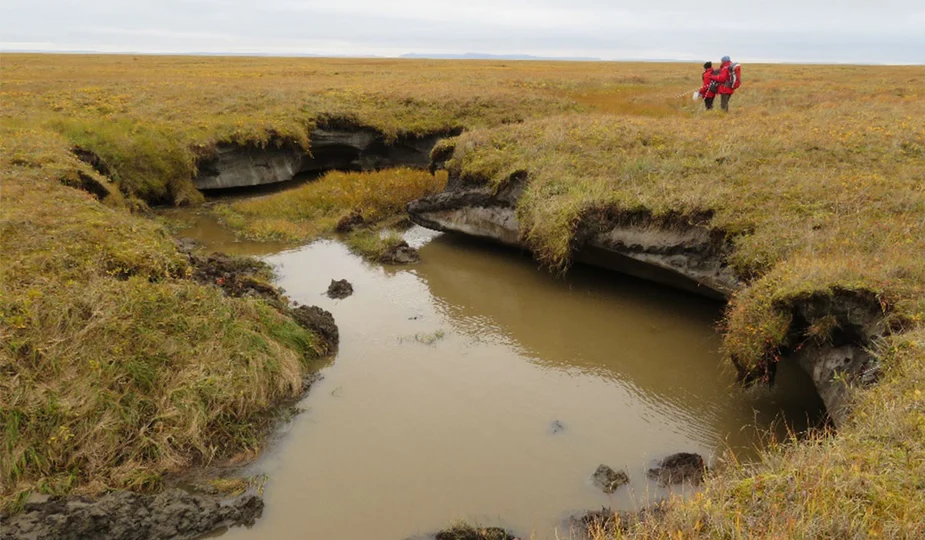Why permafrost might thaw sooner than expected
In a new study, experts (HU, AWI, University of Oslo) simulate various climate warming scenarios in northeast Siberia
Experts from the Alfred Wegener Institute, Helmholtz Centre for Polar and Marine Research (AWI), the Humboldt-Universität zu Berlin (HU) and the University of Oslo have determined that much of the permafrost that is currently still very cold might disappear by the end of the century. What’s new about their simulations: the inclusion of thermokarst processes. The outcomes of the study have just been released in the journal Nature Communications.
Climate change is producing higher temperatures, and is especially causing the permafrost soils found in higher latitudes and mountainous regions to thaw. When this happens, large quantities of greenhouse gases can be released into the atmosphere, where they intensify global warming. Another consequence: due to the melting ice, these soils lose their stability, resulting in the formation of small and large depressions as well as landslides. This change in the landscape is referred to as thermokarst. Using new computer models, experts from the Alfred Wegener Institute, Helmholtz Centre for Polar and Marine Research, the Humboldt-Universität zu Berlin and the University of Oslo have taken a closer look at how thermokarst processes can affect the thawing of permafrost in northeast Siberia, a region that is home to extremely cold and therefore presumably stable permafrost, in a range of climate warming scenarios.
“What we’ve determined is that, if thermokarst processes are taken into account, a great deal of the permafrost that is currently still very cold, say, roughly minus ten degrees, could be gone by the end of this century. In contrast, if thermokarst is disregarded, the permafrost mostly remains stable in the models’ projections,” says geo-researcher Jan Nitzbon, who is currently pursuing his doctorate at the AWI and the Humboldt-Universität zu Berlin. Thermokarst processes are widespread in the ice-rich permafrost of Siberia and Alaska, yet they have largely been ignored in efforts to model the development of permafrost in response to climate warming.
In recent years permafrost researchers have observed that, on a local scale, thermokarst processes can accelerate the thawing of permafrost. “Our findings largely confirm this. However, we also factored in stabilising processes that could slow the thawing. We were amazed to find that, in a moderate warming scenario, these braking processes could significantly limit the rapid thawing of permafrost,” Nitzbon explains. Nevertheless, in a more intensive warming scenario, this factor was outweighed by positive feedback processes, which resulted in extensive permafrost thawing and dramatic landscape changes.
For their study, the researchers developed new methods that are intended to enhance Earth system models, since they can more realistically reflect permafrost thawing in a warming Arctic.
The team’s findings also indicate that limiting anthropogenic global warming could help to protect Arctic ecosystems from the massive changes accompanying the thawing of ice-rich permafrost.
Publication:
Nature Communications volume 11 (2020): Fast response of cold ice-rich permafrost in northeast Siberia to a warming climate
Jan Nitzbon, Sebastian Westermann, Moritz Langer, Léo C. P. Martin, Jens Strauss, Sebastian Laboor, Julia Boike
Contact:
Jan Nitzbon
Alfred Wegener Institute, Helmholtz Centre for Polar and Marine Research
jan.nitzbon(at)awi.de
Humboldt-Universität zu Berlin
Hans-Christoph Keller
Spokesperson
Phone: +49 30 2093-2946
pr(at)hu-berlin.de
Press release Humboldt-Universität zu Berlin, 04.05.2020
